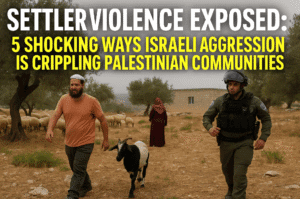Settler Violence Exposed: 5 Shocking Ways Israeli Aggression Is Crippling Palestinian Communities
In Hebron’s Masafer Yatta and Um al-Kheir, Israeli settlers escalated attacks on Palestinian communities by releasing livestock to destroy olive and almond crops—a deliberate tactic to undermine livelihoods. Coordinated with military presence, settlers abducted resident Ahmad al-Hathalin after interrogations, intensifying fears of forced displacement. This follows recent waves of violence: tents burned, livestock stolen, and farms razed in Ein Al-Hilwa and Arab Al-Mleihat.
Such acts, illegal under international law, violate the Fourth Geneva Convention, which prohibits population transfers and property destruction in occupied territories. Targeting agriculture—central to Palestinian identity and survival—reflects a broader strategy to erase cultural and economic autonomy. Despite grassroots resistance, systemic impunity persists as global inaction enables settler aggression. Urgent accountability is needed to halt these war crimes and protect vulnerable communities.

Settler Violence Exposed: 5 Shocking Ways Israeli Aggression Is Crippling Palestinian Communities
In the contested region of Hebron, a disturbing pattern of aggression has emerged as Israeli settlers intensify tactics to disrupt Palestinian agricultural communities. Recent incidents in Masafer Yatta and Um al-Kheir underscore a broader strategy of economic suffocation and territorial encroachment, raising urgent legal and humanitarian concerns.
Recent Incidents and Immediate Impact
On April 30, 2025, settlers released livestock into Palestinian farmlands in Masafer Yatta, deliberately targeting olive and almond groves belonging to farmer Ahmad Ismail Abu Arram. Rateb Jabour, a local anti-occupation coordinator, condemned the act as part of a systematic effort to erode Palestinian presence. Simultaneously, in Um al-Kheir, settlers accompanied by Israeli forces grazed animals near homes, escalating tensions. Activist Osama Makhamra reported the abduction of resident Ahmad al-Hathalin following interrogations, highlighting the militarized collaboration between settlers and security forces.
Broader Pattern of Violence
These events follow a wave of attacks across the West Bank. Two weeks prior, settlers burned tents, stole livestock, and assaulted Bedouin families in Ein Al-Hilwa, decimating fragile communities. In Arab Al-Mleihat, agricultural lands were torched, and homes demolished. Days earlier, raids near Ramallah left a young man critically injured and a farm destroyed. Such acts not only devastate livelihoods but also deepen fears of forced displacement.
Legal and Humanitarian Context
Under international law, all Israeli settlements in the West Bank are illegal. Article 49 of the Fourth Geneva Convention explicitly prohibits an occupying power from transferring its population into occupied territories. The deliberate destruction of crops and property—a tactic termed “domestic terrorism” by Palestinian advocates—constitutes a war crime, depriving families of sustenance and cultural heritage. Olive trees, symbolic in Palestinian identity, represent both economic survival and ancestral ties to the land.
Community Resilience and Call for Accountability
Despite systemic harassment, communities like Masafer Yatta persist in nonviolent resistance, relying on grassroots organizations to document abuses. Yet, the lack of meaningful international intervention perpetuates impunity. Local activists urge global bodies to enforce legal rulings against settlement expansion and hold perpetrators accountable.
Conclusion
The targeting of Palestinian agriculture transcends property damage—it is an assault on self-determination. As settler violence escalates under military protection, the silence of the international community risks normalizing violations of both human rights and international law. Protecting vulnerable communities demands not only condemnation but actionable measures to uphold justice in a region where survival itself has become an act of defiance.
You must be logged in to post a comment.